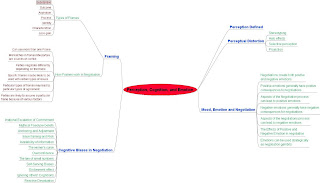Perception, cognition and emotion .The perception is related to the process of negotiation, with particular attention to forms of perceptual distortion that can cause problems of understanding and meaning making for negotiators. Perception defined process by which individuals connect to their environment and sense-making process. This selective perception occurs through a number of perceptual “shortcuts” that allow to process information . Perceptual distortion have a four major perceptual errors stereotyping, Halo effects, selective perception, and projection.
A frame is the subjective mechanism through which people evaluate and make sense out of situations, leading them to pursure or avoid subsequent actions. Framing about focusing, shaping and organizing around negotitor. If so can be shaped or reshaped as a function of information and communication during negotiation . This is a several aspects of frames
different type of frames.
How frames work in negotiation situations.
The interests /right /power approach to negotiation framing.
How frame change as a negotiation encounter evolves.
Cognitive biases in negotiation in this one we examine how negotiators use information to make a decisions during the negotiation. Better than being perfect processors of information , it is quite clear that negotiation have a tendency to make systematic have a tendency to make systematic errors . These errors collectively labeled cognitive biases, tend to impede negotiatior performance including the irrational escalation of commitment, mythical fixed-pie beliefs,the process of anchoring and adjustment in decision making, issue and problem framing, the availability of information, the winner's curse, negotiatior overconfidence,the law of small numbers, self-serving biases, the endowment effect, the tendency to ignore others cognitions and the process of reactive devaluation. Mood, Emotion and negotiation is based on three characteristics: specificity, intensity, and duration

No comments:
Post a Comment